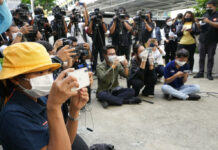
BANGKOK — Since 1932, when Thailand officially entered the company of democratic nations, its citizens have spent more years living under dictators than democracy.
That was a reminder shared by Bundit Chanrojanakit, a Ramkhamhaeng University political science professor at a panel discussion on Thailand’s search for democracy Saturday at Chulalongkorn University.
Organized by the Internet Law Reform Dialogue, or iLaw, the panel held as part of a broader conference on social issues this weekend drew about 70 people to hear speakers take turns defending the virtues of a democratic system and examining its shortfalls in Thailand.
Read: Censorship is Acceptable Compromise at Chula Conference on Social Issues
As it proceeded, a man took pictures of the crowd from different angles. When it came time for questions and comments at the end, the moderator asked if he should turn off the Facebook Live stream so participants could speak freely.
It was arranged in place of a more pointed panel organized by a student pro-democracy group to dissect the constitution pushed through earlier this year by the military regime. That session, planned by the New Democracy Movement, was canceled under pressure by the authorities.
Chulalongkorn University historian Suthachai Yimprasert said democracy is the least evil of systems because people can disagree and find solutions together. He said dictatorship also has a mechanism to solve conflicts, but it is based on coercion.
He added that some Thais say electoral democracy is “four-second democracy,” because voters only have power in that fleeting span of time when casting a ballot, because power shifts into the hands of elected politicians afterward.
“This is still better than not even having a second of democracy,” Suthachai told the audience.
Chiang Mai University law lecturer Somchai Preechasilpakul made a specific reference to junta-leader-cum-premier Gen. Prayuth Chan-ocha, saying no democratic regime would point a finger and order people to do various things such as exercise.
Somchai was making reference to Prayuth’s recent pet project of “Workout Wednesdays” for government officials, which has carried over into public events where he has instructed crowds to spontaneously exercise.
Human rights around the world, such as the U.S. Civil Rights Movement which improved the status of black Americans, have only advanced under democratic systems, according to Pongkwan Swasdipakdi of Thammasat University.
Pongkwan, a lecturer in Thammasat’s political science department, added that Thais should think about why some support military coups and see them as legitimate.
Yuthaporn Isarachai, vice rector of Sukhothai Thammathirat Open University said the fact some still doubt if Thailand is suited for democracy means the nation must do more to deepen its democratic roots.















































